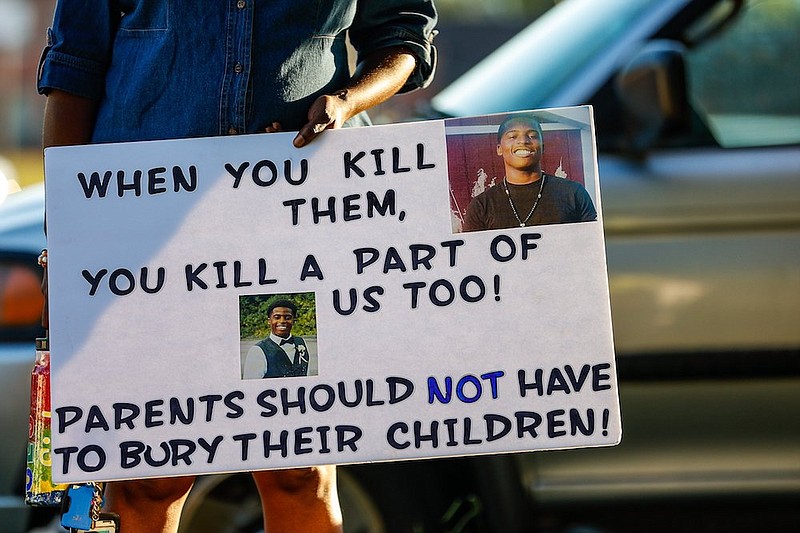Chattanooga had a mass shooting Saturday night. Two women were killed and five other females - the youngest was 14 - were wounded.
It was the city's third shooting just that day. Just. That. Day. None of the three, for now, are believed to be connected.
To be fair, the term "mass shooting" varies depending on whose definition is used. We're using the definition of the well-respected, independent Gun Violence Archive, which calls a mass shooting one in which four or more people are injured by gunfire. GVA has no affiliation with any advocacy organization and maintains an online searchable database of gun violence incidents collected from more than 7,500 law enforcement, media, government and commercial sources daily in an effort to provide near-real time data about the results of gun violence.
Local police, however, do not characterize the weekend violence as a mass shooting, according to department spokeswoman Elisa Myzal. She said CPD uses the Congressional Research Service and FBI definition: events where more than four people are killed with a firearm within one event, and in one or more locations in close proximity.
By any definition, seven people shot in one setting is too many. Too much heartache, too much fear and too much chaos.
Chattanooga's latest tragedy took place on Grove Street in the city's Westside - in College Hill Courts, an 80-year-old housing project. It happened outside in a large gathering of people. Myzal didn't call the gathering a party, but she said there were no previous calls for any disorders before the shooting.
Why were all the victims women? Myzal called that "a question we'd all like to have the answer to."
According to WKRN in Nashville, a shooting last week in Collierville near Memphis leaving one dead and 14 wounded marked Tennessee's 10th mass shooting in 2021.
(READ MORE: 'It makes no sense': Community mourns after weekend of violence in Chattanooga)
On Saturday morning, a domestic dispute over a 10-month-old left four adults dead and another wounded in McMinn County, bringing the count to 11. Chattanooga gave the state its 12th for the year. On Sunday, No. 13 came in Memphis.
And just so you know, this is not Chattanooga's first turn on this tragic dance floor. The Gun Violence Archive lists nine mass shootings here since January 2013.
Chattanooga police already have tried many things - from roadside stops to neighborhood "saturations" to a controversial anti-gang program called the Violence Reduction Initiative.
In the years since, police have moved to a more community policing focus with a large dose of technology. On April 2019, police showed off a new "Real Time Intelligence Center" and its then-29 public safety cameras located around the city.
Another effort to curb gun crime came in July when former Chief David Roddy ordered the move of five officers from the Gang Unit to the Gun Team, effective July 2. The change meant the gun unit would have nine investigators, two sergeants and one civilian technician. They track stolen guns.
But no matter what our city tries, one has to question how much headway we can make in a state where our lawmakers and governor have recently given almost every person over 18 carte blanche to buy and carry a gun with no permit, no training, no background check.
That said, gun violence prevention should not be something for CPD to bear alone. Nor is Chattanooga inherently violent.
Myzal puts it well. "A small number of people are ripping apart parts of the city, neighborhoods, and families. Gun violence is a problem to which CPD is not the solution, but an interacting agency. Community-wide, community-driven response is what is needed."
What does that look like?
It looks like help and crisis intervention in our most at-risk homes - something Mayor Tim Kelly is pushing with his $1 million-a-year Crisis Response Team to support the police department day-to-day while we shore up public education and economic opportunities for all. And it looks like the police department's gun team, as well as the city's growing partnership with private businesses' surveillance systems.
It looks like finding ways to use funding from the Cares Act and the American Rescue Plan for violence disruption as cities across the country are seeing homicide and violence numbers climb. Mayor Kelly is, as we write, in New York at a summit of mayors hosted by the Bloomberg Institute and Harvard University to discuss these very issues, according to Mary Beth Ikard, the mayor's director of communications.
But it also looks like all of us - the community.
One simple proactive measure people could make right now is removing firearms from vehicles or at least securing them properly. More than half of the 311 firearms reported stolen from vehicles this year through Aug. 31 came from unlocked vehicles.
"We see guns as a central driving problem," said Joda Thongnopnua, chief policy officer for the Kelly administration. "They ratchet up the body count, and they do it fast. ... We have to really seriously think about what the implications of stolen guns are right now."
The city also, as always, invites people to tell police if they know ahead of time that something is about happen - and someone almost always does. But Thongnopnua said the city, feeling the urgency of this moment, also is inviting us to share intervention ideas for future policy discussions. We can share them with the city via email to policy@chattanooga.gov.
"We know there's a lot of value in looking at papers and research and other models, but there's also a tremendous amount of value in people's lived experience. And so, we're listening," he said.
Chattanooga, beyond just walking with more candles to honor the victims, we have to help. Really help.
